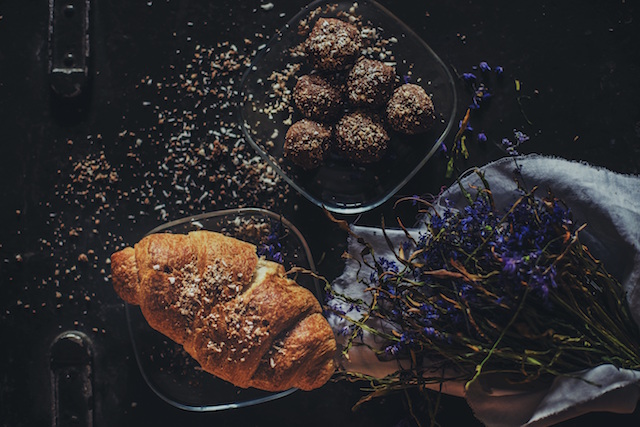Traditional thinking suggests carbohydrates are bad for us.
I take a different perspective: Carbs are the single most important thing we can eat for health and weight loss. In fact, my plan is a high-carbohydrate diet.
We’re taught to believe carbohydrates contribute to insulin resistance, heart disease, and other health concerns.
Well, some do, but the truth becomes more complicated. “Carbohydrates” encompasses a huge category. A hot fudge sundae and cauliflower both fall into the “carbs” category, yet they are entirely different foods.
In fact, almost all plant foods fall into the carbohydrate category. These are what I refer to as slow carbs, which are low-glycemic and don’t spike blood sugar or insulin. These slow carbs come loaded with nutrients, fiber, and amazing molecules called phytochemicals.
When we ate a wide array of fresh fruits and vegetables teeming with phytonutrients—carotenoids, flavonoids, and polyphenols—they help improve nearly all health problems, including dementia, diabesity, and aging.
Ideally, about three-quarters of our carbohydrate intake should come from non-starchy veggies plus low-glycemic fruits. By volume, most of our plate should be carbs. Note I said volume, not calories. Many plant-based carbohydrates actually have very few calories.
Unfortunately, most people don’t choose healthy carbohydrates. We eat quickly absorbed carbohydrates from sugar, high fructose corn syrup, and white flour, which are very efficiently turned into belly fat in the body.
The important difference involves how carbohydrates affect our blood sugar. Calorie-wise, sugar is different from those that come from protein, fat, or non-starchy carbs. Sugar scrambles all our normal appetite controls, so we consume more and more, driving our metabolism to convert it into lethal belly fat.
On the other hand, high-fiber, low-sugar carbohydrates such as broccoli are slowly digested and don’t lead to blood sugar and insulin spikes. These slow carbs reduce cancer risk and increase our body’s ability to detoxify. Table sugar and bread, on the other hand, are quickly digested carbs that spike our blood sugar.
Therein lies the key difference. Slow carbs like broccoli heal rather than harm.
Good-quality, plant-based carbohydrates provide unique benefits, including high levels of vitamins and minerals, fiber, and special plant compounds with healing properties called phytonutrients, or phytochemicals. Phytochemicals are medicinal molecules such as curcumin in turmeric, glucosinolates in broccoli, anthocyanidins in berries and black rice, and so on. Many of these foods are high in fiber, which helps buffer out their sugar content.
When we focus on these low-glycemic-load plant foods, our weight normalizes. We feel better without the sugar crashes. We reduce our risk for numerous diseases.
We need to go beyond this oversimplified thinking and classify carbohydrates into four categories to help us make the optimal choices:
- Green carbs: eat freely. Slow-burning, low-glycemic vegetables should be the basis of our diet. These are all-we-can-eat foods!
- Yellow carbs: eat moderately. These include whole grains, legumes, dark berries, stone fruit, apples and pears. All of these are nutrient rich, but can stall weight loss in some individuals.
- Red carbs: go easy. These include starchy, high-glycemic cooked vegetables (like winter squashes, peas, potatoes, corn, and root vegetables such as beets.) as well as higher-sugar fruits like grapes and melons. We want to portion these out and use them as treats, not dietary staples.
- Forbidden carbs. Skip these altogether or use them very sparingly. They include gluten-containing whole grains, dried fruit, and processed foods including low-carb fruits.
Can a Low-Carb Diet Benefit Us?
“But Dr. Hyman, I did really well on a low-carb diet,” a patient will occasionally say.
I’m not denying they can work. While nearly everyone does well incorporating nutrient-dense slow carbs, in some cases a very low carb diet can be beneficial.
For people with Type 2 diabetes, high blood sugar, and/ or obesity, we may need to restrict or cut out good carbs, even starchy veggies and fruit for a period of time before including them in our diet.
The trick involves gradually introduce slow carbs. As insulin sensitivity improves, we can increase our consumption of slow carbohydrates like lentils, yams, fruit, and whole grains from time to time.
Please see my book The Blood Sugar Solution 10-Day Detox Diet for a comprehensive list of smart carbohydrates. I’ve divided the plan into three phases, with step-by-step directions on what to eat and when as well as a road map for what to do after that 10-Day Detox, and how to transition to a long-term health and weight loss strategy based on my book The Blood Sugar Solution.
What works better for you: A low-carbohydrate diet or intelligently implementing healthy carbs into your diet? Share your perspective below or on my Facebook page.
Relephant Reads:
Do this One Thing & Lose the Weight for Good.
Eat Healthy Carbs To Lose Weight.
Author: Dr. Mark Hyman
Editor: Emily Bartran
Photo: Olenka Kotyk/Unsplash

 Share on bsky
Share on bsky







Read 0 comments and reply